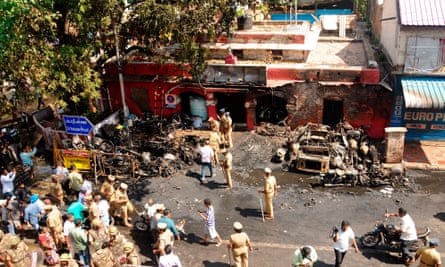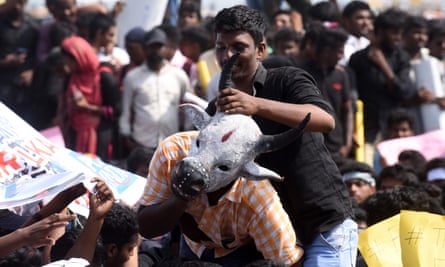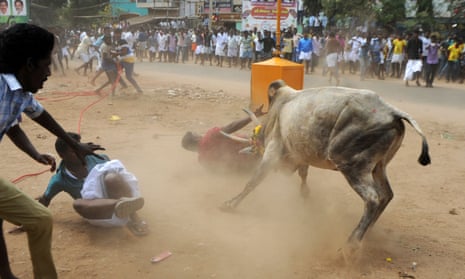Politicians in the southern Indian state of Tamil Nadu have passed an emergency order allowing bull-taming festivals to resume after a ban led to widespread protests that saw a police station set alight in Chennai.
The city was brought to a standstill after the week-long protests involving thousands of people against the ban on “jallikattu”, a traditional bull-taming ritual in which men compete to hold the hump of an agitated bull for a particular distance or time.
Jallikattu sessions went ahead on Sunday after the Tamil Nadu government passed a temporary law the day before. Two people were killed and more than 50 reportedly injured, adding to a reported death toll of more than 1,100 participants since 2010. The order on Monday makes the lifting of the ban permanent, but is subject to scrutiny by India’s supreme court.
Unlike the Spanish variation, bulls involved in jallikattu are rarely killed. It was banned in 2014 by the supreme court, which cited evidence of the animals being “deliberately taunted, tormented, mutilated, stabbed, beaten, chased and denied even their most basic needs”.

The central and state government had tried to lift the ban, resented by some ethnic Tamils as an encroachment on their cultural rights by India’s more populous Hindi-speaking north.
Police used tear gas and baton charges on Monday morning to disperse the thousands of demonstrators who had occupied Chennai’s Marina Beach for the past six days to demand the legalisation of jallikattu festivals.
As officers closed in, Indian media said the crowd sang the country’s national anthem and made threats to drown themselves in the ocean, though no casualties were confirmed.
A police station near the beach was torched while fishing boats displaying black flags were stopped as they tried to resupply the protesters with food and water by sea.
Among the the demonstrators to be forcibly removed from Marina Beach was Ashwin Kumar, who told the Guardian the sport was integral to Tamil culture and was misunderstood by outsiders.
“Cows get hurt at times and humans also get hurt,” said Kumar, 28. “But when you have a kid, you play with them, and if something happens you take your kid to the doctor, right?
“That’s what we do. If a cow gets hurt it is treated by a vet or the owner of the cow – its father – who has been breeding it from day one. And if anything happens, the whole family will sit and pray for the cow.”

Critics, including the Animal Welfare Board of India, say the sport is “inherently cruel” and that other customs such as sati, where widows were burned on their husband’s funeral pyres, were phased out when attitudes changed.
“There are many alleged cultural practices which have been outlawed by courts,” said Anjali Sharma, a supreme court lawyer and member of the AWBI, who helped argue the case that led to the sport’s ban.
“For instance, child marriage has been outlawed. Sati is not permitted by the law. We have a constitution, and all laws have to adhere to its norms.”
She said court-appointed observers had documented examples of bulls being given alcohol or having chilli powder thrown in their faces to disorient them. “Legally an animal cannot be forced to do something that does not come naturally to it,” she said.
“Horses enjoy running; bulls do not. They are draught and pack animals, that are largely peaceful, and to get them to run you have to goad them. That can only be done by prodding it, poking it, twisting its tail or administering alcohol.”
Jallikattu is one of several cultural and religious traditions to be scaled back or banned under the scrutiny of India’s courts in recent years.
In August, revellers flouted restrictions on dahi-handi, a Hindu ritual where children ascend a human pyramid up to 30-feet high, and smash a pot of curd or milk to mark Lord Krishna’s birthday.
Protests in favour of jallikattu were also held in the past week in other cities across Tamil Nadu, as well as in the Indian capital, Delhi, and overseas, including by members of the Tamil diaspora in the US and Australia.
There have been calls by senior Tamil Nadu politicians for a crackdown against the international animal rights group People for the Ethical Treatment of Animals, which was involved in legal action and campaigns against the sport.
On Monday evening, as demonstrations continued across the state, Kumar predicted the law passed by the Tamil Nadu legislature to lift the ban was unlikely to survive a supreme court challenge: “They cannot do it the way they’ve done it.”
